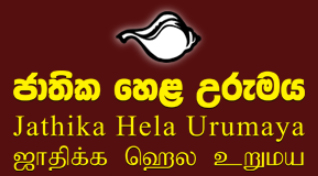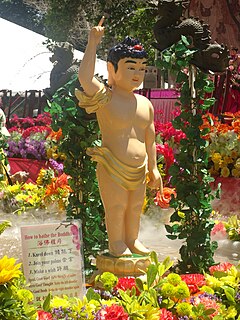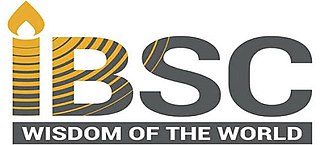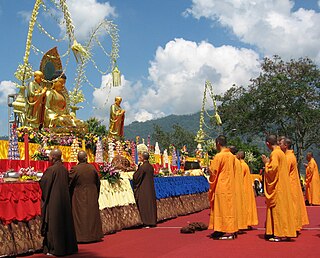
Theravada Buddhism is the State religion of Sri Lanka practiced by 70.2% of the Sri Lanka's population. Buddhism has been given special privileges in the constitution and also declared country's official religion by 2nd president of sri Lanka J.R Jayawardene. Sri Lanka is traditionally oldest religious Buddhist country where Buddhist aryan culture is protected and preserved. The island has been a center of Buddhist scholarship and learning since the introduction of Buddhism in the third century BCE producing eminent scholars such as Buddhaghosa and preserving the vast Pāli Canon. Throughout most of its history, Sri Lankan kings have played a major role in the maintenance and revival of the Buddhist institutions of the island. During the 19th century, a modern Buddhist revival took place on the island which promoted Buddhist education and learning. There are around 6,000 Buddhist monasteries on Sri Lanka with approximately 15,000 monks.

The Jathika Hela Urumaya is a right-wing nationalist political party in Sri Lanka. The JHU was launched in February 2004 by the lay-based, Sinhala nationalist political party Sihala Urumaya. Founding members include Kolonnawe Sumangala Thero, Uduwe Dhammaloka Thero, Ellawala Medhananda Thero, Omalpe Sobhitha Thero, Athuraliye Rathana Thero and Thilak Karunaratne. Some Sri Lankan Buddhists, including the All Island Clergy Organization, denounced the decision by monks to enter politics. The party drew support mainly from the middle class conservatives and the Buddhist youth.

Buddha's birthday is a holiday traditionally celebrated in most of East Asia to commemorate the birth of the Prince Siddhartha Gautama, later the Gautama Buddha and founder of Buddhism. It is also celebrated in South and Southeast Asia as Vesak which also acknowledges the enlightenment and death of the Buddha. According to the Theravada Tripitaka scriptures, Gautama was born c. 563/480 BCE in Lumbini in modern-day Nepal, and raised in the Shakya capital of Kapilvastu, in the present day Tilaurakot, Nepal. At the age of thirty five, he attained enlightenment (nirvana) underneath a Bodhi tree at Bodhgaya. He delivered his first sermon at Sarnath, India. At the age of eighty, he died at Kushinagar, India.

The SiamNikaya is a monastic order within Sri Lanka, founded by Upali Thera and located predominantly around the city of Kandy. It is so named because it originated within Thailand. The Siyam Nikaya has two major divisions and five other divisions within these two major units. The Malwatta and Asgiriya chapters have two separate Maha Nayakas or chief Monks.

The Buddhist flag is a flag designed in the late 19th century to symbolize and universally represent Buddhism. It is used by Buddhists throughout the world.

Poya is the name given to the Lunar monthly Buddhist holiday of Uposatha in Sri Lanka, where it is a civil and bank holiday. Full moon day is normally considered as the poya day in every month.

Bhikkhu Bodhi, born Jeffrey Block, is an American Theravada Buddhist monk, ordained in Sri Lanka and currently teaching in the New York and New Jersey area. He was appointed the second president of the Buddhist Publication Society and has edited and authored several publications grounded in the Theravada Buddhist tradition.

The Uposatha is a Buddhist day of observance, in existence from the Buddha's time, and still being kept today in Buddhist countries. The Buddha taught that the Uposatha day is for "the cleansing of the defiled mind," resulting in inner calm and joy. On this day, both lay and ordained members of the sangha intensify their practice, deepen their knowledge and express communal commitment through millennia-old acts of lay-monastic reciprocity. On these days, the lay followers make a conscious effort to keep the Five Precepts or the eight precepts. It is a day for practicing the Buddha's teachings and meditation.

It is estimated that in the Middle East around 900,000 people, perhaps more, profess Buddhism as their religion. Buddhist adherents make up just over 0.3% of the total population of the Middle East. Many of these Buddhists are workers who have migrated from Asia to the Middle East in the last 20 years, many from countries that have large Buddhist populations, such as China, Vietnam, Thailand, Sri Lanka, and Nepal. A small number of engineers, company directors, and managers from Japan, Taiwan, Hong Kong, Singapore, and South Korea have also moved to the Middle East.

Ven. Thich Nhat Tu or Thích Nhật Từ in Vietnamese is a Vietnamese Buddhist reformer, an author, a poet, a psychological consultant, and an active social activist in Vietnam. He is committed to propagate Buddha's teachings through education, cultural activities and charitable programs in order to benefit the individuals and the society at large.

Māgha Pūjā is the second most important Buddhist festival, celebrated on the full moon day of the third lunar month in Cambodia, Laos, Thailand, Sri Lanka and on the full moon day of Tabaung in Myanmar. It celebrates a gathering that was held between the Buddha and 1,250 of his first disciples, which, according to tradition, preceded the custom of periodic recitation of discipline by monks. On the day, Buddhists celebrate the creation of an ideal and exemplary community, which is why it is sometimes called Saṅgha Day, the Saṅgha referring to the Buddhist community, and for some Buddhist schools this is specifically the monastic community. In Thailand, the Pāli term Māgha-pūraṇamī is also used for the celebration, meaning 'to honor on the full moon of the third lunar month'. Finally, some authors have also referred to the day as the Buddhist All Saints Day.
This is a list of holidays celebrated within the Buddhist tradition.

Ven. Dr. Tampalawela Dhammaratana, French and Sri Lankan national, was born in Sri Lanka and received his traditional Buddhist education from Sangharaja Pirivena in Kandy and Sunetradevi University College. During his very early education, he had special privilege to study under the guidance of leading traditional Buddhist monastic scholars, in Sri Lanka and he became in proficient in Pali, Sanskrit and Sinhala languages and especially Theravada Buddhism. He received his Buddhist ordination under the instruction of Most Ven. Pitadeniye Sri Ratanapala Sangha Nayake Thera of Uva Wellassa Provinces in Sri Lanka and later he received his Higher Ordination in 1976 at Siam Maha Nikaya, Malwatte Chapter in Kandy, Sri Lanka.

Witiyala Seewalie Thera is the founder and chief incumbent priest of Minnesota Buddhist Vihara. Currently, he is serving the Buddhist spiritual needs for people in six midwestern states: Minnesota, Wisconsin, South Dakota, North Dakota, Iowa and Nebraska.

P. D. Premasiri is a Buddhist scholar specializing in the areas of Buddhist Ethics and Buddhist Philosophy. Premasiri's academic training represents a synthesis of both the Buddhist and Western philosophical traditions, first at the University of Peradeniya and subsequently at Cambridge and Hawaii. He is currently President of the Buddhist Publication Society and Professor Emeritus in the Department of Pali and Buddhist Studies at the University of Peradeniya.

1998 Temple of the Tooth attack is an attack on the Temple of the Tooth Relic, located in Kandy, Sri Lanka. The shrine, which is considered to be important to the Buddhists in Sri Lanka, houses the relic of the tooth of the Buddha, and is also a UNESCO designated World Heritage Site. In 1998, it was attacked by Liberation Tigers of Tamil Eelam (LTTE), a separatist militant organization which fought to create an independent Tamil state in Northern and Eastern parts of the country, from 1983 to 2009.

International Buddhist Museum is the world's first International Buddhist Museum. It is located next to the National Museum of Kandy and Temple of the Tooth in Kandy, Sri Lanka. The site was the former Palace of the Kandian King, Wimaladharmasuriya, upon which the British constructed a Victorian era building, which housed the Kandy Kachcheri.

International Buddhist Studies College(IBSC) is a graduate college of Mahachulalongkornrajavidyalaya University in Wang Noi District, Phra Nakhon Si Ayutthaya Province, Thailand. IBSC was established in order that students from all over the world, who are interested in Buddhism, will be provided with an opportunity to pursue research in Buddhist studies.

Poson, also known as Poson Poya, is an annual festival held by Sri Lankan Buddhists celebrating the arrival of Buddhism in Sri Lanka in the 3rd century BC. The festival is the most important Poya holiday of the year and the second most important Buddhist holiday of the year, being surpassed in importance by Vesak. Poson is celebrated throughout the island, with the most important ceremonies of the festival being held in Anuradhapura and Mihintale. The festival is held in early June, coinciding with the June full moon.
















